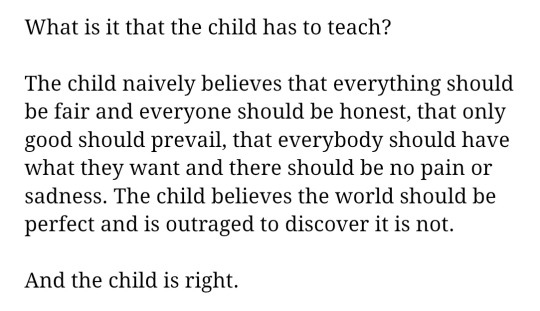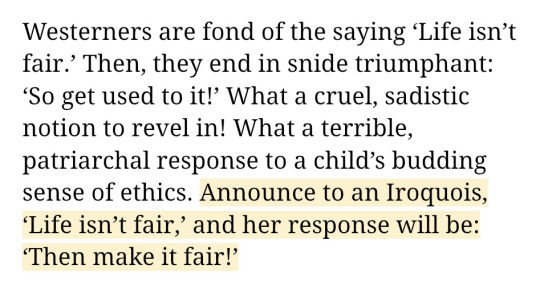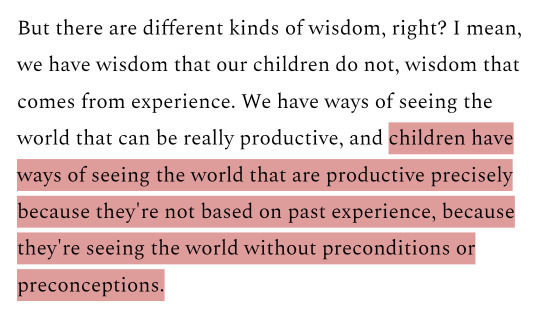#^ quote by Tzvi Freeman
Text








the thing about children is that they’re always delighting in the world in front of them.
wisdom to heal the earth, rabbi tzvi freeman / madeleine l’engle / grave of the fireflies (1998) dir. isao takahata / iroquoian woman, barbara alice mann / rainer maria rilke / star wars: attack of the clones (2002) dir. george lucas / the little prince, antoine de saint-exupery / the spirituality of parenting, david spangler
#on childhood#on innocence#web weaving#literature#parallels#quotes#art parallels#literary parallels#web weave#book quotes#poetry#madeleine l'engle#tzvi freeman#grave of the fireflies#hayao miyazaki#studio ghibli#barbara alice mann#rainer maria rilke#star wars web weave#sw aotc#the little prince
910 notes
·
View notes
Text
What is it that the child has to teach?
The child naively believes that everything should be fair
and everyone should be honest,
that only good should prevail,
that everybody should have what they want
and there should be no pain or sadness.
The child believes the world should be perfect
and is outraged to discover it is not.
And the child is right.
13 notes
·
View notes
Text
Fuck dude, I finally found that quote I was looking for and I read more stuff from Rabbi Tzvi Freeman and it’s just hitting me hard. Like the one I was looking for was this:
The child naively believes that everything should be fair and everyone should be honest, that only good should prevail, that everybody should have what they want and there should be no pain or sadness. The child believes the world should be perfect and is outraged to discover it is not. And the child is right.
And like, that is one of the most important moral beliefs for me personally, and I become outraged when someone insists that believing this is naïve and a result of immaturity. Like I’m sorry you became sad and bitter, but I refuse to and I work hard every day to focus on hope and compassion and it baffles me that anyone could see that as a flaw or as something I should grow out of. I will always refuse to.
A child cannot learn something without running out and screaming it to others. And so it should be with all those who have knowledge.
This is another one that hits me hard bc I feel like sharing knowledge is one of the truest forms of love. At least for me personally. Like, when we are young our parents teach us as much as they can as fast as they can to help us grow into the best people that we can be. They love us so much that they try to share as much knowledge with us as we can learn, but why does that stop when we become older? Why do so many treat correcting false information as a personal insult and belittlement? Why do so many treat someone who shares knowledge as a braggart and assume this person must think themselves superior? I know that it is because of pride, that to be corrected damages the ego and to be taught new things makes one feel inferior. But they shouldn’t. And I am baffled and upset that they do.
And then, as the child emerges to discover that the world outside is not quite the same as that sanctuary, we will explain, "Yes, this is not the way it is supposed to be. But it is only temporary. You and I and all of us, we are going to change it. We are partners in the act of creating this world, because it is our mission to perfect it. And we are doing this now, with acts of beauty and kindness, one good deed at a time."
Is this not the entire purpose of life? Community? Society? I am so earnestly begging to not feel like I am alone, screaming this out for no one to hear.
I am not (currently) religious at all, much less Jewish, so I have no idea how I came across Rabbi Freeman’s writing, but it just speaks to me so incredibly. I’ll end this way-to-long post with one final quote from him:
A child gives love for the sake of love. But even an adult can learn to do the same.
#my words#poetry#in a way#in all honesty I cried the first time I read that stuff#I just now realized that like I never understood what was meant by “a strong sense of justice” meant as an autistic trait#and like I think it means this lmao#file that under things that I thought didn’t make me autistic but actually very much did
104 notes
·
View notes
Quote
What is it that the child has to teach?
The child naively believes that everything should be fair and everyone should be honest, that only good should prevail, that everybody should have what they want and there should be no pain or sadness. The child believes the world should be perfect and is outraged to discover it is not.
And the child is right.
Rabbi Tzvi Freeman
24 notes
·
View notes
Text
Countdown to the Abyss: Epigraphs
Each chapter of The Abyss begins with a quote - as they say in the literature biz, an epigraph. Here are the epigraphs for the 8 chapters of The Abyss.
1.
Somewhere out there is someone who had loving parents, watched clouds on a summer’s day, fell in love, lost a friend, is kind to small animals, and knows how to say “please” and “thank you,” and yet somehow the two of you are going to end up in a dirty little room with one knife between you and you are going to have to kill that human being.
– Unknown Armies RPG playbook, by Greg Stolze (thanks to @inklesspen for showing me this)
2.
“Where have all the young girls gone?
Gone to soldiers, every one.
Oh, when will they ever learn?
Oh, when will they ever learn?”
– “Where Have All the Flowers Gone” by Pete Seeger
3.
You are here. Ah, you do not flee.
You will answer me until the last cry.
Curl against my side as if you were afraid.
Nevertheless, a strange shadow once ran across your eyes.
– Poema 14 by Pablo Neruda (my translation)
4.
I’m doing a balancing act with a stack of fresh fruit
in my basket. I love you. I want us both to eat well.
– “Our Beautiful Life When It’s Filled With Shrieks” by Christopher Citro
5.
«It is not possible to conceive of a greater evil than the deliberate killing of a child.»
– Aximili-Esgarrouth-Isthill, Megamorphs #3: Elfangor’s Secret
6.
“What is it that the child has to teach?
The child naively believes that everything should be fair and everyone should be honest, that only good should prevail, that everybody should have what they want and there should be no pain or sadness. The child believes the world should be perfect and is outraged to discover it is not.
And the child is right.”
— Rabbi Tzvi Freeman
7.
“To actually reckon with the reality, one would not have to feel a simple ‘unseemliness’ in defending the bombings, but a deep and tormenting perversity. Again, that isn’t to exclude the possibility of making the ‘better than the alternative’ argument. It is merely to say that in order to make an argument justifying the obliteration of 100,000 civilians, slight discomfort will not do. If the utilitarian case is ever to be made, it must be made through tears.”
– from the essay “How to Justify Hiroshima” by Nathan J. Robinson (hat tip to @joysweeper)
8.
“So you must wake up every morning knowing that no promise is unbreakable, least of all the promise of waking up at all. This is not despair. These are the preferences of the universe itself: verbs over nouns, actions over states, struggle over hope.”
― Ta-Nehisi Coates, Between the World and Me
11 notes
·
View notes
Photo

It is the greatest of struggles, but one who makes peace between his ego and his mission in life, he can make peace between the world and its purpose of creation. Between woman and man. Between earth and heaven. Rabbi Tzvi Freeman See my website for today's new post. Be inspired and connect to your deeper soul's purpose. Follow my blog if you want to understand more... 👇👇👇 See my bio for blog link. Follow me @shanniealv #spirituality #jewandgentile #mindfulness #meditation #peaceonearth #blogger #love #god #quotes #encouragement #universe #inspiration #unity #wordsofwisdom #awakening #awareness #christianchallenge #believeinyourself #loveyourself #oneness #goodvibesonly #islamchallenge #soul #connection #strength #unity #liveandlearn #hope #divinepurpose💜🗝 #thoughtprovoking https://www.instagram.com/p/CWL3SC4rUCx/?utm_medium=tumblr
#spirituality#jewandgentile#mindfulness#meditation#peaceonearth#blogger#love#god#quotes#encouragement#universe#inspiration#unity#wordsofwisdom#awakening#awareness#christianchallenge#believeinyourself#loveyourself#oneness#goodvibesonly#islamchallenge#soul#connection#strength#liveandlearn#hope#divinepurpose💜🗝#thoughtprovoking
0 notes
Text
Good morning.
Today, we return to the final part of Jesus's Johannine argument about "bread from heaven".
When we left off, he had just moved from an explanation that sounded metaphorical ("I am the living bread") to one that sounded more literal ("the bread [...] is my flesh"). He got the reaction you could expect: confused incredulity.
Faced with that incredulity, he went even further, even more explicit, shifting his phrasing of "eat my flesh" from a neutral word for "eat" to a more visceral one, one that could almost be translated as "gnaw". He got the reaction you could expect: confused disgust, and a fair number of people becoming convinced he was crazy.
...and they have a point. Not just with the whole "eat me, no literally eat me" thing.
We've talked before about how counterintuitive the Kingdom of Heaven is. This is just a more extreme example.
Isn't the simplest explanation that it is crazy nonsense? That it defies the logic of this world because it is illogical?
Forget that a lot of Jesus's fanbase left over this... why haven't we left too?
In the forty years between leaving Egypt and conquering Canaan, the descendants of Israel were faced with a similar question.
They had been saved from slavery, but they had been led out into a desolate place. They were nomads for two generations. There were hunger and thirst scares, disease, battles with hostile cities... the future seemed scary, uncertain. Again and again, we hear some of them complain that, even if they had been slaves in Egypt, it'd be better than this. It was a hard life, but the hardness was a familiar hardness, not the terror of a fate they couldn't understand or prevent.
They had these doubts even after all the miracles, after the plagues and the parting of the sea and the manna and the travelling spring. After all, these were miracles, but they were miracles they couldn't understand. They couldn't make sense of this god who'd saved them, whose ways were so different than those of any god they'd ever heard of, growing up in Egypt.
Perhaps that's why they turned so readily away from the commandment against idols, and made the golden calf. After all, to imagine God in the Egyptian way... to assign an animal theme to the "god of Abraham" that had rescued them, and make a lavish statue of it, and throw a festival, and offer it sacrifices... that was familiar! That was logical! That made sense!
...when we say something is "logical", it's less about what is actually logically self-consistent, and more about what fits the experiences we've happened to have so far.
I grew up Catholic. I grew up with the nonsensical idea of the "real presence of Jesus in the Eucharist". So I might know intellectually how shocking and nonsensical an idea it is, okay, but it doesn't feel that way? Because I'm already used to it, because I grew up with everyone around me just accepting that it's true.
If I'd grown up atheist... or Jewish... I suspect my initial reaction to hearing the idea would have been way different.
But this doesn't solve our problem.
If what we see as "logical" is subjective, and we want to look outside it for a truth we might have missed, then there are a trillion trillion "illogical" ideas you could latch onto.
Why this one? Aside, again, from having just so happened to have grown up inside it, and thus to not see it as illogical?
...I think there is another qualification, which the message of the Kingdom satisfies.
Peter speaks to it, if clumsily. When he refuses to leave with the others, he does it by expressing a nameless longing: where else could we find something like this? Someone like you?
And one way that we know the truth slips past our cultural preconceptions is by way of nameless longings, for which we long despite not having a name for them.
Consider the person with a vitamin deficiency, who doesn't realize until eating a pickle or whatever that it was what they've been craving, what their body has been needing, for weeks.
Consider - and fight me on this if you must - the trans woman who grew up in a culture where such things were unheard of, but somehow encountered the idea later in life, somehow accepted that it was an option, and then suddenly realized it was an answer to a question that had been murmuring deep inside her for decades, just without the vocabulary to understand it or recognize it for what it was.
Why did the Israelites keep coming back to God after burning themselves on their failures to live up to the covenant? Why did they swear themselves to God in the excerpt from Joshua today, despite his warnings that they would surely fall short of what they swore? What were they looking for?
I once described the Kingdom as our native land, which we had lost somehow, yet still rings a familiar, nostalgic note to us.
And if we are to take pre-accultured longings as evidence, consider what Hassidic Rabbi Tzvi Freeman once pointed out about children: that across the whole world they always long for, expect, a world better than ours. This world's logic has not yet stamped out a child's genetic memory of a world outside its paradigm, where suffering is unnecessary and justice is as natural as the rain and "every tear is wiped away".
After all, if we're "made in God's image", then despite only having the language of this world, we're made for the same world God is from. It's in our flesh and blood, in our DNA, "on our lips and in our hearts". The glimpses of the Kingdom that we get in scripture excite the imagination because they give us a taste of what we had, all this time, been missing without even knowing we were missing it.
Despite Paul only having the language of the culture he grew up in, and its... let's not mince words, sorta sexist ideas of what marriage is about... those are the symbols he has, and so that's how he describes the devotion we feel for God, and the love God feels for us, and the physical closeness that Jesus's gift of the Eucharist can create - a gift that, by a counterintuitive, nonsensical-sounding miracle, satisfies an inexpressible longing for closeness that no merely spiritual or theoretical God could answer, that no cold golden statue could provide.
Despite hearing Jesus try to explain that miracle and gift today, and probably failing to understand it any better than the crowd did, Peter nonetheless recognized that it answers something that nothing else can answer. Because he didn't say he understood - just that... well, even if he doesn't understand, where else can he go? Who else can speak like this? Who else can stir up his heart like this?
Even if it's "illogical"... well, anything you don't understand starts that way.
Even if it's "illogical"... well, people often do things that seem illogical if they've found that they work.
Even if it's "illogical"... well, illogical things can still be valuable.
And we sense that value, because the promises of the Kingdom answer a need that people have been longing to fill since we became people.
And so the Israelites resolved to try again. To vow again, even if they'll break that vow, even if they still haven't begun to understand the logic that justifies the covenant to which they're swearing.
May we be able to take that same sort of leap of faith, to try to live the Kingdom even if we don't understand it, and in doing so, come to understand it through the learned experience of the fruit it bears in our lives.
0 notes
Text
"The dagger flashed its light, illuminating the landscape to the heavens. The darkness vanished. And so did the dragon.
You switched it off, hesitating to place it back in its sheath. Good thing. The dragon was instantly back again, larger and fiercer than before.
Backing off, you attempted the same move again. Foolishly. The result was no different. As long as the dagger emitted its photons, the dragon was gone. As soon as it switched off, the dragon was immediately back.
“They found light sitting in a room,” you heard the voice of your Coach echoing in your mind. “Light, would you like to meet darkness?”
0 notes
Text
"Until the dragon reaches Eden, it is still a dragon.”
1 note
·
View note